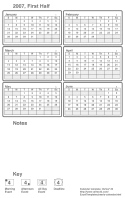 Casting about for topics to pitch an editor? Here’s a source of story ideas you might have overlooked: local news talk radio stations.
Casting about for topics to pitch an editor? Here’s a source of story ideas you might have overlooked: local news talk radio stations.
News radio stations have to fill airtime 24 hours a day, seven days a week. That’s a lot of 30- to 45-second stories to tell. In between news headlines on the half hour, traffic and weather “on the eights” (or the fives or the tens), and the commentary, the nooks and crannies are filled with great topics that you can mine for inspiration — seasonal hints, interesting citizens, notable businesses, winning teams, and upcoming events. Just find your own slant, identify some interview prospects, and serve. Just be sure to give credit where it is due, when appropriate; it will show your professionalism and your attention to detail. (“Hey, he really did his research!”)
Pitching to a magazine that serves a regional market that you don’t know much about? Look for nearby news stations that stream their broadcasts live on the web. You can find stream lists in your media player, by visiting stream broadcasters like Live365, or by consulting online station directories such as Streaming Radio Guide. If you want to really fine-tune your search, Radio-Locator lets you search by Zip code, station call letters, and topic.
Like electricity, radio is always there, waiting for you to plug in.
Image: iStockPhoto.com

 Freelance writers usually spend a lot of time negotiating with clients and
Freelance writers usually spend a lot of time negotiating with clients and  With December fast approaching, now is a good time to start printing out your new hPDA calendar templates for the first half of 2010. You can download them for free on the Active Voice
With December fast approaching, now is a good time to start printing out your new hPDA calendar templates for the first half of 2010. You can download them for free on the Active Voice  Although the Dow may have peaked 10,000 again, freelancers tend to operate in a “lagging indicator” market — a lot of companies still have yet to really rebound, and once they do they have to develop fresh confidence that their rebound is not about to re-rebound. Then they can build up their work and staff again — and then they’ll be able to think about farming work out to their stable of freelancers again.
Although the Dow may have peaked 10,000 again, freelancers tend to operate in a “lagging indicator” market — a lot of companies still have yet to really rebound, and once they do they have to develop fresh confidence that their rebound is not about to re-rebound. Then they can build up their work and staff again — and then they’ll be able to think about farming work out to their stable of freelancers again. IPhone and iPod Touch apps for creating and editing business documents have surged to the top ranks of the App Store’s popularity charts. This is good news for freelance writers who work in the field and who like to travel light.
IPhone and iPod Touch apps for creating and editing business documents have surged to the top ranks of the App Store’s popularity charts. This is good news for freelance writers who work in the field and who like to travel light. I’m always looking for useful analogies to convey how good editing can improve advertising copy, web features, white papers, and other written communications. This morning I was reading an article about medicine and it hit me that what editors do when revising a piece of written work is analogous to what doctors do when diagnosing a patient’s symptoms.
I’m always looking for useful analogies to convey how good editing can improve advertising copy, web features, white papers, and other written communications. This morning I was reading an article about medicine and it hit me that what editors do when revising a piece of written work is analogous to what doctors do when diagnosing a patient’s symptoms.